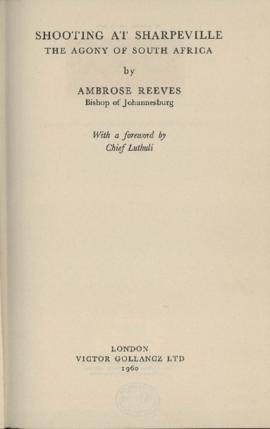Shifty Records Project Collection
- ZA SAHA AL3296
- Fonds
- 1985 - 1990
The materials deposited by Lloyd Ross (series A-C) form the core of the Shifty Records project collection and include Shifty Records organisational material, but largely a wealth of materials relating to the musicians whose music Shifty recorded, such as the digitised audio recordings, artists’ correspondence, lyric sheets, press releases, news clippings and photographs, as well as digitised copies of album releases (covers, inner sleeves and vinyl records). Documents from the Shifty archive (series A) were withdrawn from SAHA by Lloyd Ross in 2020 and lodged with the Africa Open Institute (AOI) for Music in Stellenbosch as part of their Hidden Years Project. All digitised items included here will remain accessible on this site.
Series D contains materials donated by people other than Lloyd Ross:
Michael Drewett donated education material relating to music and censorship; copies of materials relating to the censorship of Shifty Records' Kalahari Surfers release 'Bigger than Jesus' and Mzwakhe Mbuli's 'Change is Pain'.
Copies of materials relating to the SABC's restriction on airplay of music recorded by Shifty Records were obtained from the SABC Record Library and include: Agendas of the SABC Central Record Acceptance Committee (CRAC) meetings; SABC internal correspondence memos; lyric sheets with comments by the SABC CRAC on why a particular song was restricted; faxes from the SABC Record Librarian to Shifty records to inform them of decisions taken by CRAC; and digitised copies of a number of vinyl records with covers and inner sleeves containing the ‘Avoid’ stickers next to song titles and scratched tracks to prevent DJs from playing the songs.
In order to fill the gaps identified in the collection, SAHA has also obtained artefacts from other sources, such as Shifty artists, Shifty workers and Shifty friends.
Series E contains the oral history component of the project and materials include the audio recording and transcripts of interviews with Lloyd Ross, Warrick Sony, Carl Raubenheimer, Brendan Jury, Chris Letcher, Mzwakhe Mbuli, Koos Kombuis, Chris Letcher, Matthew van der Want, Gary Herselman, Simba Morri, Willem Möller, Roger Lucey, and Hannalie Coetzee. The interviews were conducted by Michael Drewett on behalf of the South African History Archive (SAHA) and the Rhodes University Department of Sociology for the Shifty Records Legacy Archive Project in 2013-2014, and transcribed by Victoria Hume.
Untitled

